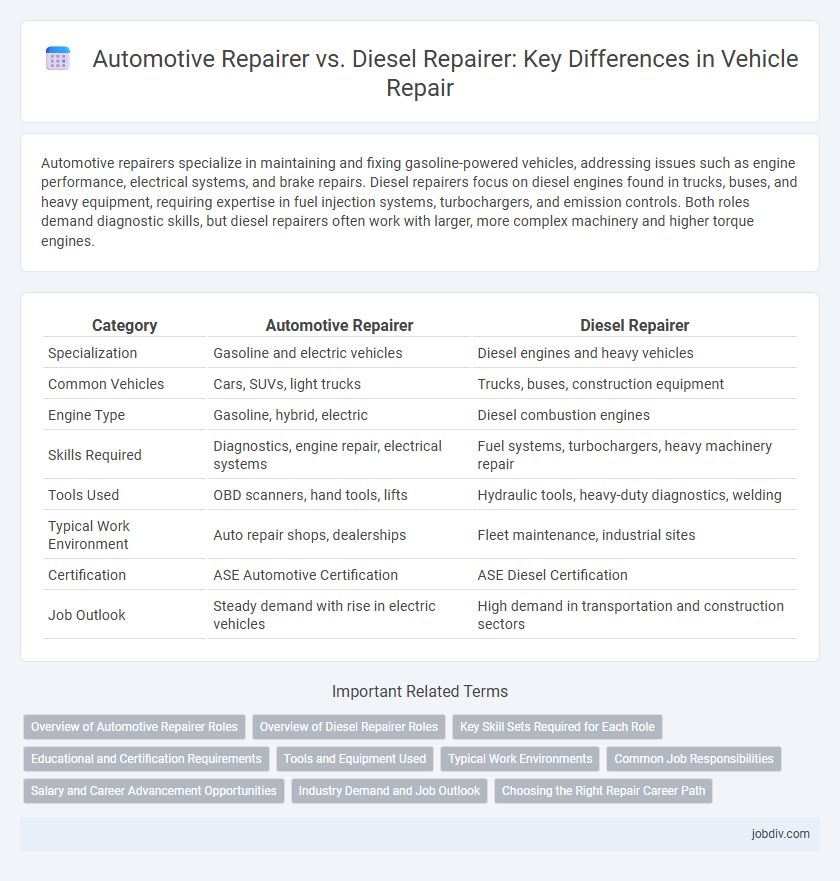Automotive repairers specialize in maintaining and fixing gasoline-powered vehicles, addressing issues such as engine performance, electrical systems, and brake repairs. Diesel repairers focus on diesel engines found in trucks, buses, and heavy equipment, requiring expertise in fuel injection systems, turbochargers, and emission controls. Both roles demand diagnostic skills, but diesel repairers often work with larger, more complex machinery and higher torque engines.
Table of Comparison
| Category | Automotive Repairer | Diesel Repairer |
|---|---|---|
| Specialization | Gasoline and electric vehicles | Diesel engines and heavy vehicles |
| Common Vehicles | Cars, SUVs, light trucks | Trucks, buses, construction equipment |
| Engine Type | Gasoline, hybrid, electric | Diesel combustion engines |
| Skills Required | Diagnostics, engine repair, electrical systems | Fuel systems, turbochargers, heavy machinery repair |
| Tools Used | OBD scanners, hand tools, lifts | Hydraulic tools, heavy-duty diagnostics, welding |
| Typical Work Environment | Auto repair shops, dealerships | Fleet maintenance, industrial sites |
| Certification | ASE Automotive Certification | ASE Diesel Certification |
| Job Outlook | Steady demand with rise in electric vehicles | High demand in transportation and construction sectors |
Overview of Automotive Repairer Roles
Automotive repairers specialize in diagnosing, maintaining, and repairing a broad range of passenger vehicles, including cars and light trucks, using advanced diagnostic tools and mechanical expertise. They handle engine repairs, brake systems, electrical components, and routine maintenance tasks to ensure vehicle safety and performance. In contrast, diesel repairers focus specifically on diesel-powered vehicles such as heavy trucks, buses, and industrial machinery, requiring specialized knowledge of diesel engines and fuel systems.
Overview of Diesel Repairer Roles
Diesel repairers specialize in maintaining and fixing diesel engines used in trucks, buses, and heavy machinery, focusing on engine diagnostics, fuel systems, and exhaust emissions. Their expertise includes working with complex engine components, electronic controls, and hydraulic systems distinct from gasoline-powered vehicles serviced by general automotive repairers. Diesel repairers play a critical role in industries relying on heavy-duty vehicles, ensuring operational efficiency and compliance with environmental regulations.
Key Skill Sets Required for Each Role
Automotive repairers require expertise in gasoline engines, electrical systems, and diagnostics technology to service a variety of passenger vehicles efficiently. Diesel repairers possess specialized skills in heavy-duty diesel engines, fuel injection systems, and emissions controls critical for trucks, buses, and industrial equipment. Both roles demand strong mechanical aptitude and proficiency with computerized diagnostic tools, but diesel repairers often need advanced knowledge of turbocharging and air brake systems unique to diesel-powered machinery.
Educational and Certification Requirements
Automotive repairers typically require a high school diploma or equivalent and often pursue certifications from the National Institute for Automotive Service Excellence (ASE) to demonstrate proficiency in gasoline engine repair and electrical systems. Diesel repairers usually need specialized technical training from vocational schools or community colleges, focusing on large diesel engines found in trucks and heavy equipment, and obtain ASE certifications specific to medium and heavy truck service. Both roles benefit from ongoing education to stay updated on evolving vehicle technologies and diagnostic techniques.
Tools and Equipment Used
Automotive repairers primarily use diagnostic scanners, hydraulic lifts, and computerized wheel alignment machines to service gasoline-powered vehicles. Diesel repairers rely on heavy-duty tools such as torque wrenches, engine analyzers, and specialized compression testers designed for diesel engines. Both professions require a comprehensive set of hand tools, but diesel repairers often need equipment compatible with larger, more robust engine components and fuel systems.
Typical Work Environments
Automotive repairers typically work in well-lit, climate-controlled garages with access to computerized diagnostic equipment for passenger cars and light trucks. Diesel repairers often operate in larger service bays or outdoor settings, handling heavy-duty vehicles such as buses, trucks, and construction equipment that require specialized tools and heavy machinery. Both environments demand physical stamina and adherence to safety protocols, but diesel repair settings tend to be more industrial and rugged.
Common Job Responsibilities
Automotive repairers and diesel repairers both diagnose and fix vehicle issues, but automotive repairers primarily handle gasoline-powered cars, performing tasks such as engine tune-ups, brake repairs, and electrical system diagnostics. Diesel repairers specialize in diesel engines found in trucks, buses, and heavy machinery, focusing on fuel injection systems, turbochargers, and emission controls. Both roles require proficiency in using diagnostic tools, conducting routine maintenance, and ensuring vehicles meet safety and performance standards.
Salary and Career Advancement Opportunities
Automotive repairers typically earn a median salary of around $45,000 per year, while diesel repairers command higher wages, averaging approximately $55,000 annually due to the specialized skills required. Diesel repairers have greater career advancement opportunities in sectors like trucking and heavy machinery, where expertise in large engines is essential. Automotive repairers often have more entry-level openings but may face slower salary growth compared to diesel specialists.
Industry Demand and Job Outlook
Automotive repairers and diesel repairers both experience steady demand, but the diesel repair sector shows stronger job growth due to increased commercial trucking and heavy equipment use. Diesel repairers require specialized skills in engine diagnostics and maintenance, often commanding higher wages and more job stability in industries like transportation, construction, and agriculture. Automotive repairers face moderate demand primarily from consumer vehicle maintenance and industry trends toward electric vehicles, which may shift required skill sets over time.
Choosing the Right Repair Career Path
Automotive repairers specialize in maintaining and fixing gasoline-powered vehicles, focusing on engines, transmissions, and electrical systems, while diesel repairers work primarily with heavy-duty trucks, buses, and industrial machinery powered by diesel engines. Choosing the right repair career path depends on interest in vehicle types, technical skills in engine systems, and job market demand, with diesel repairers often commanding higher wages due to specialized expertise. Both careers require certifications, such as ASE for automotive repair and the National Institute for Automotive Service Excellence Diesel Certification, to ensure proficiency and advance career opportunities.
Automotive Repairer vs Diesel Repairer Infographic

 jobdiv.com
jobdiv.com